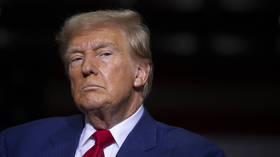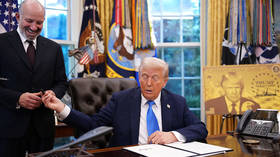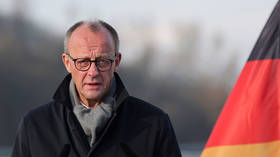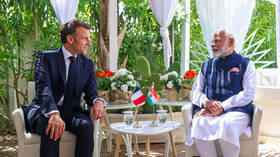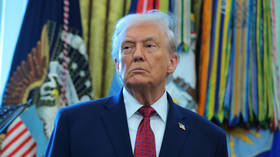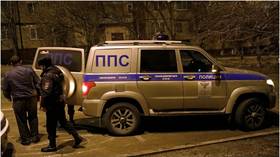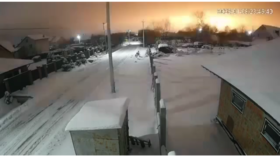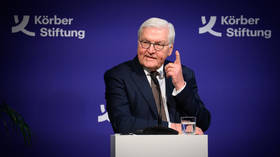Ecuador oppressed by tyranny of capital just like Europe – Correa to RT
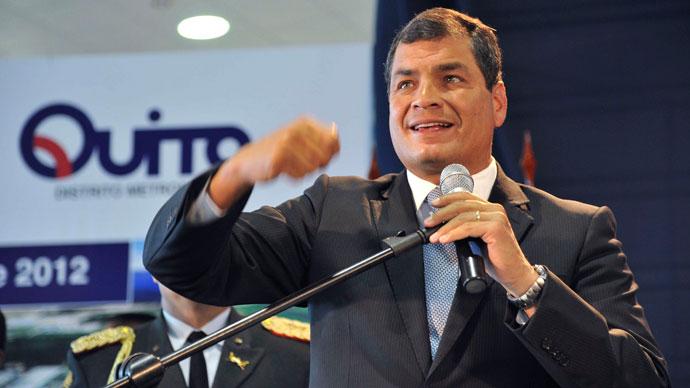
Ecuador is being ravaged by the same capitalist greed that blights Europe, newly reelected President Rafael Correa said. The leader of Latin America’s fastest growing economy spoke to RT in an exclusive interview, shortly after his victory.
Rafael Correa, president of Ecuador since 2007, defeated his nearest rival, former banker Guillermo Lasso, by more than 30 percent.
Addressing his supporters in the capital, Quito, President Correa called for "another four years of revolution".
Talking to RT, Correa detailed his main goals for his third four-year term, including promises to fight poverty, unemployment and social inequality, as well as corruption.
RT: Hello, thank you for your time. First of all, congratulations on your victory!
Rafael Correa: Thank you RT! I’d like to take this opportunity to send the warmest regards to Latin America and the whole world.
RT:Last year, Julian Assange’s case stirred up polemics all over the world. What goals did Ecuador pursue by granting him political asylum?
RC: Why all the polemics? When Sweden, which has already provided political asylum to numerous Latin Americans does it again, will that stir up polemics as well?
As for the practical implication of Julian Assange’s situation, it is up to Europe to resolve. The problem will be solved if the UK grants him safe passage. There hasn't been any intention to disrupt the prosecution process of the Swedish justice system, in spite of numerous misinformed allegations. If they send a prosecutor to Ecuador's Embassy in Britain and record the interrogation on video, which they can do, it would untwist this knot. That is, if they really have to interrogate him, Julian Assange was never even officially presented with charges. If Assange’s lawyer, Baltasar Garzon, is lucky at the European Court and achieves safe passage for Assange, who’s staying at the Ecuadorian Embassy, the situation will be finally resolved. It is all now in Europe’s hands. Ecuador has done what it had to do by exercising its sovereignty. Our country isn’t obliged to ask permission for it, or to explain it, all the more so, to apologize for using its right for sovereignty.
RT:That’s right. But now it feels as if Julian Assange is trapped in the embassy forever. Can you see any way out of it at all?
RC: You should ask Europe. It is now up to the UK, Sweden and the European Court to find a way out.
RT:When could we expect a solution to this problem, do you think?
RC: Any day now – with the consent of the UK. But there is a lot of arrogance involved here and a neo-colonialist sentiment, too. They would like us to offer explanations as to why we granted him asylum. Why on Earth? There’s more, they even want us to backtrack on our decision. But we will never do that.
RT:Do you also think that Julian Assange may be extradited to the US rather than Sweden?
RC: Odds are it could happen. Before granting him asylum, we had studied Mr. Assange’s case for a few weeks. Finally we concluded that he had every reason to ask for it, so we fulfilled his request.

RT:We may say that it wasn’t only you, who won last night, but Hugo Chavez gained a victory as well, returning to his homeland. You were among the first who came to visit him in Cuba. You dedicated your victory to Mr. Chavez. How would you describe his current health, and when do you think will he be able to get back to work?
RC: Even if you had seen him prior to the operation, which was, beyond all doubt, extremely complex, it wouldn’t have occurred to you that he was sick. You would have found him in his normal state and in a cheerful mood. Moreover, he looked fine, but the operation was extremely difficult, and we all knew that. As far as we know, he’s now recovering, and the fact he could make it back to his dear Venezuela – is such good news. He loves Cuba, but Venezuela is his homeland. So, I am pretty sure this will be the best remedy for Hugo. Anyway, we wish him the speediest recovery. And he’d better not be that unyielding: the first thing he did after having returned to Venezuela, was congratulate me on my victory. I wish he would put to one side everything that’s going on in Latin America for at least a week, and focus on his recovery.
RT:Do you think that’s possible?
RC: No, it’s just my wish, but I know it won’t come true.
RT:Assuming Hugo Chavez won’t be able to get back to performing his duties, are you ready to take over in Latin America?
RC: I’m always asked that. I’m sorry, but it shows you are unaware of what is going on in Latin America. Nobody is striving for the headship here. Hugo Chavez is a born leader, and there’s no competition in trying to upstage the others. Nobody thinks “I’ll be the next leader. But if Hugo keeps the post, I’ll become the deputy leader”. This is not our situation- our goal is to serve our people. I guess I can speak on behalf of Cristina, Evo Morales, Hugo, Dilma and other stakeholders of this historic transformation in Latin America that we don’t strive to get things for ourselves. Everything we do is for the sake of the people. We will always try to provide our people with what they need, even if we talk about a working-class citizen, who is working hard on a daily basis in the construction industry, or an agricultural worker, and so forth. Be it even the President himself. We aim at serving our people, not wishing anything for ourselves.
RT:Barack Obama has been re-elected, and so has been Hugo Chavez. The same applies to you. The leading figures in this hemisphere continue to hold their positions. So what is the probability of change in the region, given that the key players are the same?
RC: What kind of change do you mean?
RT:Those changes that the members of this alliance have hoped for? For example, regarding the civil revolution…
RC: It’s sad but true. I believe that President Obama is a nice man – but he has changed nothing in American foreign policy. The US continues to abide by its double-standard policy. It continues to talk about human rights while torturing prisoners in Guantanamo. It’s enough for a bloody dictator who destroys his own people to be an ally of the US to become a great democratic ruler. The US will support him and invite to Washington to deliver speeches.
But if we don’t back Washington, they will portray us as dictators and accuse us of violating fundamental freedoms, like the freedom of the press. Unfortunately, this has not changed in years. Again, I’m convinced that Barack Obama is a very good man and a very good citizen, but he hasn’t changed US foreign policy at all, especially when it comes to Latin America. And we do need to have it changed, because this double-standard policy is no longer tolerable.

RT:After winning the election, you said that your goal is to make the revolution irreversible. What do you need to do in order to achieve this goal?
RC: Latin America’s problem is that it is ruled by the elite and that is not some advanced elite looking for a common good. No, that is the elite that usurped the fruits of technical progress and refused to share them with anyone. They even set up exclusive neighborhoods to live in. You know that Guillermo Lasso, my rival at the recent elections, says that I allegedly represent the elite. But I suggest you go and have a look at the place where HE lives, with its swimming pools and doors that have keycard locks. I would never be allowed to go in – I simply wouldn’t make the cut. So they live in these isolated neighborhoods, cut off from the whole world, with their own elitist schools, which don’t provide the best education, but it’s so expensive that only the rich can afford it. These rich guys marry their equals and then so do their kids in order to perpetuate their domination. Basically, they have their own exclusive clubs. So this is the elite that has taken over all of Latin America, and these are the power institutions that used to rule us, the capitalist states that represented the interests of the minority and barred access to all other social strata. The revolution is all about transforming the existing power balance between citizens according to the interests of the majority and putting people above capital. Just like Europeans, we are also oppressed by the tyranny of capital. We need to make these capitalist states people-oriented for the benefit of all of us, with no discrimination. We have already achieved a lot, but things may roll back. That’s the message I’m trying to get across to Ecuadorians. We must do our best to keep these changes in the balance of power and to make people the leading force in our country, rather than bankers, or corrupt mass media, or domineering states, or international bureaucracies like the IMF, or capitalists, in particular, those capitalists who set the tone before the citizen’s revolution.
RT:People have an incredible trust in you and your government. Your popularity has been growing, after all these years. How would you explain that?
RC: Our dear friend, the President of Argentina Cristina Fernandez de Kirchner, said one of the reasons is that governments are now similar to their people. In the past, governments were trying to imitate a foreign model in an attempt to meet foreign interests. They spoke Spanish while thinking in English, if they were thinking at all. Now, though, governments work honestly and openly, though not without mistakes. But these people are patriots willing to give their all for the good of people they represent. So people finally get a sense that their government protects their interests.
RT:What do you see Ecuador as being like in four years?
RC: We will certainly not be able to tackle all the problems by the end of my term. Among other Latin American countries, Ecuador is first in terms of reducing poverty and the gap between rich and poor, considering Latin America is the top region in terms of social inequality. Our economy is one of the fastest growing, we also have the lowest unemployment rate, of 4.1 per cent. But in spite of all these achievements, it would not be possible to tackle all the issues. Poverty remains an acute problem, and so does unemployment and social inequality. But it’s important that the country stays on this path and develops in terms of social justice within the concept that we presented to the entire world. This is a concept of a life full of dignity. As I mentioned, it’s very important to change the balance of forces. In this land, Ecuadorian people are the most-important aspect rather than bankers, media, or foreign states. In this country, the priority is placed on people rather than money.
RT:You’ve said this is your last presidential term, after which you would no longer run for office. I can’t imagine that such a strong individual like you would leave without having finished what you’ve started, as it would be simply impossible to finalize everything over the four years.
RC: It’s true, but there are a lot of other people who would finish building our new homeland. I’ve been undeservedly happy my entire life. Before the presidency, I was a university professor. I was teaching economics, and I was wearing jeans, t-shirts and sneakers to my lectures. In this presidential office, I’ve been happy as well. I’ve been trying to do my utmost for my homeland. When I leave office, God willing, I will continue living happily with my family, which is very important to me. My dear ones had to go through a lot when I became President, in terms of my private life’s confidentiality, due to security issues. There had been different threats and terrible attempts at undermining my reputation. So I feel that I owe a lot to my family. You said it yourself that my presence here is very significant. So if I remain in politics, I couldn’t help but influence the next president. We’re very thorough in terms of selecting our personnel. So in my case, following my four years in office, I intend to give up politics completely.
RT:Since you mentioned your family, we were told that you personally drive your son to school.
RC: Yes, I took my children to school this morning.
RT:The very next day after the election.
RC: I have to get back to my routine as quickly as possible. To tell you the truth, such events can quickly get you off track. My family isn’t staying here at the palace. We’re still living in an ordinary middle-class house in the north of Quito. But we still have to observe safety procedures and stay under surveillance cameras. My wife and daughter are escorted by security guards. Some may actually enjoy that but, for me, it’s one of the key disadvantages of being a president. You’re always surrounded by security people, you always feel threatened, and you cannot hide your private life. A large number of people hate you and try to find your faults to justify their hatred toward you and enjoy it.
RT:Thank you very much for this interview, and once again, congratulations.
The statements, views and opinions expressed in this column are solely those of the author and do not necessarily represent those of RT.


